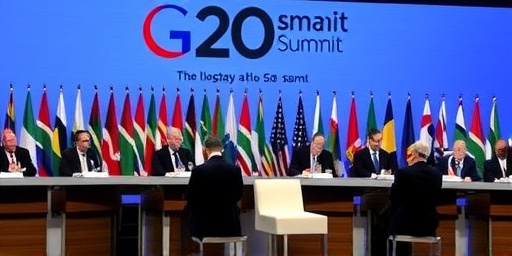In a landmark moment for international cooperation, leaders from 19 G20 nations gathered in Johannesburg, South Africa, have forged a comprehensive declaration tackling climate change, gender equality, and sustainable economic growth, even as the United States notably boycotted the event. The agreement, announced late Wednesday, marks a significant step forward amid global divisions, including heated debates over the Ukraine conflict, and underscores the G20‘s resilience without full participation from the world’s largest economy.
The summit, hosted by South Africa for the first time since the group’s inception in 1999, saw representatives from countries like Brazil, India, China, and the European Union endorse ambitious targets to limit global warming to 1.5 degrees Celsius by 2050. This comes at a time when extreme weather events have displaced millions and cost trillions in damages worldwide. Despite the U.S. boycott, which was cited by Washington officials as a protest against the summit’s perceived softness on geopolitical issues like Ukraine, the declaration has been hailed by environmental advocates as a ‘beacon of hope’ for multilateralism.
South African Hosts Drive Ambitious Climate Commitments
The Johannesburg summit kicked off with a focus on environmental urgency, where South African President Cyril Ramaphosa set the tone by emphasizing Africa’s vulnerability to climate change. ‘Our continent bears the brunt of a crisis we did not create,’ Ramaphosa stated in his opening address, pointing to recent droughts in the Horn of Africa that have led to food insecurity for over 20 million people. The G20 declaration commits members to mobilizing $100 billion annually in climate finance for developing nations by 2025, up from the previous $50 billion target that was repeatedly missed.
Key pledges include phasing out coal subsidies by 2030 in high-income G20 countries and investing in green hydrogen technologies, a nod to South Africa’s vast mineral resources for renewable energy transitions. Brazil’s President Luiz Inácio Lula da Silva, fresh from hosting the Amazon COP30 preparations, praised the agreement: ‘This is not just words on paper; it’s a roadmap to save our planet.’ Data from the Intergovernmental Panel on Climate Change (IPCC) supports the urgency, warning that without immediate action, sea levels could rise by 0.6 meters by 2100, threatening coastal cities like Cape Town and Mumbai.
Critics, however, note the absence of enforcement mechanisms. Environmental group Greenpeace issued a statement calling the deal ‘progressive but precarious,’ highlighting that without U.S. involvement—responsible for 15% of global emissions—the pledges lack the muscle to drive real change. Still, the consensus builds on the 2021 Rome G20 outcomes, where similar but less detailed commitments were made, and integrates lessons from the stalled UN climate talks.
In detailed sessions, G20 finance ministers outlined a $500 billion green infrastructure fund, drawing from the World Bank’s International Development Association. India, representing the Global South, pushed for technology transfers to help nations like its own build resilient agriculture systems. Statistics from the World Bank indicate that climate change could push 132 million more people into extreme poverty by 2030, a figure that resonated deeply in the summit’s climate-focused workshops.
Gender Equality Takes Center Stage in Economic Reforms
Parallel to climate discussions, the G20 nations advanced a bold agenda on gender equality, integrating it into broader economic policies for the first time as a standalone pillar. The declaration mandates that all member states allocate at least 30% of public procurement budgets to women-led businesses by 2030, aiming to close the global gender pay gap, which currently stands at 23% according to International Labour Organization (ILO) data.
South Africa’s Minister of Women, Youth and Persons with Disabilities, Maite Nkoana-Mashabane, led the charge, sharing stories of local entrepreneurs who have overcome barriers in male-dominated sectors like mining and tech. ‘Gender equality is not a side issue; it’s the engine of inclusive growth,’ she declared. The agreement also commits to universal access to quality childcare by 2025, addressing a key barrier that keeps 2.4 billion women worldwide out of the formal workforce, per UN Women reports.
European Union Commissioner for Equality, Helena Dalli, echoed this sentiment: ‘By embedding gender lenses in trade and investment, we’re unlocking trillions in untapped potential.’ Specific initiatives include a G20 Gender Data Hub to track progress, with initial funding from Canada and Germany totaling $200 million. This builds on the 2019 G20 Osaka commitment but goes further by tying gender equality to climate resilience, such as training women in sustainable farming techniques in sub-Saharan Africa.
Challenges persist, particularly in conservative G20 members like Saudi Arabia, where women’s workforce participation hovers below 25%. The declaration includes peer-review mechanisms to ensure accountability, a first for the group. Economists estimate that achieving full gender equality could add $28 trillion to global GDP by 2025, making this a economically savvy move amid post-pandemic recovery efforts.
U.S. Boycott Sparks Debate on Ukraine and Global Unity
The shadow of the U.S. boycott loomed large over the summit, with American officials in Washington labeling the event ‘unbalanced’ due to its handling of the Ukraine crisis. President Joe Biden’s administration had withdrawn participation weeks prior, citing frustrations over the G20’s reluctance to impose harsher sanctions on Russia, a fellow member. This marks the first time the U.S. has skipped a G20 summit since its founding, raising questions about the group’s future cohesion.
In a tense plenary session, Ukrainian Foreign Minister Dmytro Kuleba addressed the gathering virtually, urging stronger condemnation of Russia’s invasion that began in February 2022. ‘The war in Ukraine is not just Europe’s problem; it’s a test for the entire international order,’ Kuleba said, referencing the 1.5 million Ukrainian refugees hosted by G20 nations. The declaration includes a vague call for ‘peaceful resolution’ in Ukraine but stops short of new sanctions, a compromise brokered by host South Africa to avoid alienating Russia and China.
Analysts point to this as a microcosm of G20 fractures. The Carnegie Endowment for International Peace noted in a pre-summit report that the U.S. boycott could embolden non-Western powers, with China positioning itself as a mediator. Russian President Vladimir Putin sent a deputy, signaling continued engagement despite Western isolation efforts. Meanwhile, NATO allies like the UK and France used side meetings to rally support for Ukraine’s reconstruction, pledging $10 billion in aid tied to green rebuilding projects.
The Ukraine divide highlighted broader geopolitical tensions, including U.S.-China trade frictions and the Middle East conflicts. South African diplomats navigated these waters deftly, with Ramaphosa invoking Nelson Mandela’s legacy of bridge-building. ‘We cannot let one voice silence the many,’ he remarked, though the boycott’s impact was felt in diluted language on security issues.
Charting the Path Forward for G20 Influence
As the Johannesburg summit concludes, eyes turn to implementation and the next G20 host, Brazil in 2024. The declaration’s success, despite the U.S. boycott, suggests a shifting power dynamic where emerging economies are taking the lead on global challenges like climate change and gender equality. Experts predict that follow-up ministerial meetings in 2024 will test these commitments, with potential for a U.S. return if Ukraine dynamics evolve.
Looking ahead, the G20’s inclusive economic growth framework could influence UN Sustainable Development Goals, particularly SDG 5 on gender and SDG 13 on climate action. International Monetary Fund Managing Director Kristalina Georgieva commended the outcomes: ‘This declaration provides a blueprint for resilient recovery, even in divided times.’ For Ukraine, the summit’s neutral stance may pave the way for future dialogues, possibly involving neutral mediators like India and South Africa.
In the long term, the event reinforces the G20’s role as the premier forum for economic coordination, adapting to a multipolar world. With commitments totaling over $1 trillion in pledges, from climate funds to gender initiatives, the Johannesburg accord positions the group to drive tangible progress. As global temperatures rise and inequalities deepen, these agreements offer a foundation for collective action, reminding leaders that unity, even imperfect, remains essential for a sustainable future.








